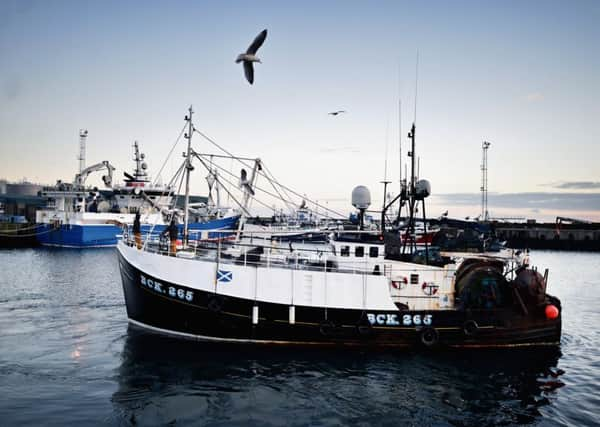UK makes first move to close its waters to foreign fishermen


Ministers will trigger withdrawal from the London Fisheries Convention, signed in 1964 before the UK joined the European Union, to start the two-year process to leave the agreement.
The convention allows vessels from France, Belgium, Germany, Ireland and the Netherlands to fish within six and 12 nautical miles of the UK’s coastline. It sits alongside the EU Common Fisheries Policy, which allows all European countries access to waters between 12 and 200 nautical miles of the UK and sets quotas for how much fish nations can catch.
Advertisement
Hide AdAdvertisement
Hide AdMinisters claim the move will help take back control of fishing access to UK waters, as it will no longer be bound by existing access agreements, and enable the country to become fully responsible for fisheries management.
UK vessels will also lose the right to fish in waters six to 12 nautical miles offshore of the other countries.
Environment secretary Michael Gove said: “Leaving the London Fisheries Convention is an important moment as we take back control of our fishing policy.
“It means for the first time in more than 50 years we will be able to decide who can access our waters.
“This is a historic first step towards building a new domestic fishing policy as we leave the European Union – one which leads to a more competitive, profitable and sustainable industry for the whole of the UK.”
Barrie Deas, chief executive of the National Federation of Fishermen’s Organisations, said: “This is welcome news and an important part of establishing the UK as an independent coastal state with sovereignty over its own exclusive economic zone.”
Scottish fishermen have welcomed the move, saying it demonstrates Westminster’s determination to regain jurisdiction over the UK’s fishing waters as part of Brexit.
Bertie Armstrong, chief executive of the Scottish Fishermen’s Federation, described the London Fisheries Convention as “anomalous” and “outdated”.
Advertisement
Hide AdAdvertisement
Hide AdHe said: “The decision to withdraw is belt and braces. We think it would fall along with the Common Fisheries Policy when we leave the EU anyway. Most importantly, it’s a strong statement of intent by the UK government of being serious about taking back beneficial control of our waters under international law.”
The UK fishing industry was made up of more than 6,000 vessels in 2015, landing 708,000 tonnes of fish worth £775 million.
Some 10,000 tonnes of fish was caught by other countries under the convention, worth an estimated £17m.
Environmental law firm ClientEarth consultant Dr Tom West said the move appeared to be an aggressive negotiating tactic.
“As a country outside the EU we need to consider how we can best co-operate with our neighbours rather than unilaterally withdrawing from all agreements in the hope that standing alone will make us better.
“Many fish stocks in UK waters are shared with our neighbours and so need co-operation and shared management.”
Will McCallum, head of oceans at Greenpeace UK, warned that pulling out would not alone deliver a better future for the UK fishing industry.
He called for ministers to re-balance fishing quotas in favour of small-scale, locally based fishing communities.